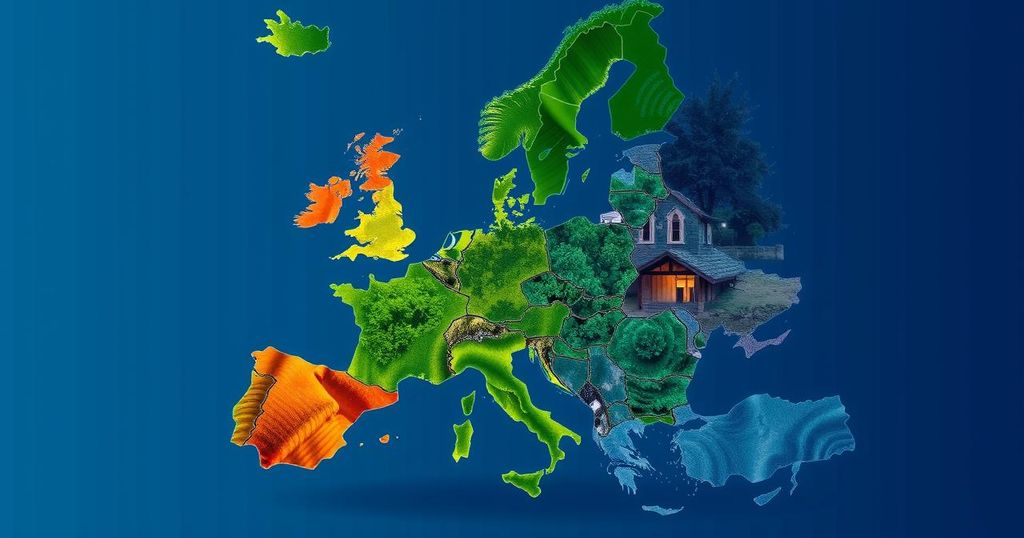Global heating is a pressing social issue demanding urgent action from the EU, which is currently falling short of its climate responsibilities. The COP29 meeting seeks to develop financial strategies and national plans under the Paris Agreement but reveals significant inequalities in the distribution of climate burdens. The EU’s emissions exceed its carbon budget, highlighting the need for policies that integrate climate justice to protect the most vulnerable communities.
Global heating represents a critical social challenge that necessitates decisive action from the European Union (EU). This week, the COP29 meeting in Azerbaijan convened to establish a framework for financial commitments towards climate change mitigation and adaptation, along with outlining national initiatives aligned with the Paris Agreement’s goal of limiting global temperatures to 1.5°C, a threshold that has recently been exceeded. Despite the diminishing credibility of such gatherings, substantial financial agreements are crucial to expedite the necessary climate actions. The dire consequences of climate inertia are already evident, affecting millions of individuals, resulting in economic distress, and drastically changing the lives of communities, particularly in regions like Valencia, Spain.
The discourse around climate justice is increasingly urgent, particularly as the impacts of climate change become more pronounced among the most vulnerable populations. The thresholds of +1.5°C and +2°C are potential ecological tipping points that could result in irreversible damage on a global scale. There exists a stark inequity in climate responsibility whereby nations that have historically contributed the most to greenhouse gas emissions suffer the least from the adverse effects, leaving those with the highest vulnerability powerless to adapt.
The EU has positioned itself as a front-runner in the climate crisis, pledging to reduce net emissions by 55% by 2030, and achieving carbon neutrality by 2050. Furthermore, it acts as a leading global financier for climate change initiatives, aspiring to mobilize $100 billion by 2025. However, our research, awaiting publication, indicates that the EU’s efforts are woefully inadequate in relation to its climate responsibilities.
Utilizing the global remaining carbon budget and reconstructing historical emissions (1850-2050), we determined that the EU has vastly exceeded its entitlement to greenhouse gas emissions. Under seven out of ten scenarios analyzed, the EU has already exhausted its climate budget. In more favorable projections, the EU will consume nearly double by 2050 if it maintains its trajectory. This indicates that even the most ambitious climate policies fail to align with the global climate budget.
Consequently, ongoing EU policies disregard principles of climate justice, perpetuating inequalities affecting the most vulnerable communities. Other major emitters, including the US, Russia, and Canada, are similarly exceeding their carbon budgets, contributing to a global challenge that fundamentally is a social issue. It is imperative that discussions surrounding climate action incorporate the social dimensions and disparities in impact.
To foster climate justice in upcoming discussions at COP29, nations must set more ambitious targets reflecting both ecological thresholds and the disparities caused by climate change. Nations in the Global North, historically significant polluters, have a moral obligation to fund global climate solutions for both mitigation and adaptation.
The ongoing crisis of global heating is recognized as a profound social challenge with significant implications for the world’s population, particularly vulnerable communities disproportionately affected by climate change. The COP29 meeting serves as a critical venue for discussing and establishing frameworks for climate financing and international cooperation to uphold commitments made under the Paris Agreement. Understanding the historical contributions to greenhouse gas emissions, particularly from developed nations, is essential in addressing equity in climate responsibilities and taking meaningful actions towards climate justice.
In conclusion, the EU’s commitment to ambitious climate policies is undermined by its disproportionate historical emissions, which exceed its fair share of the global carbon budget. As the consequences of climate change intensify, prioritizing climate justice in policy-making becomes imperative. It is essential for COP29 participants to recognize their responsibilities and ensure that measures account for both ecological limits and the need for equitable distribution of resources in the fight against climate change.
Original Source: theconversation.com






